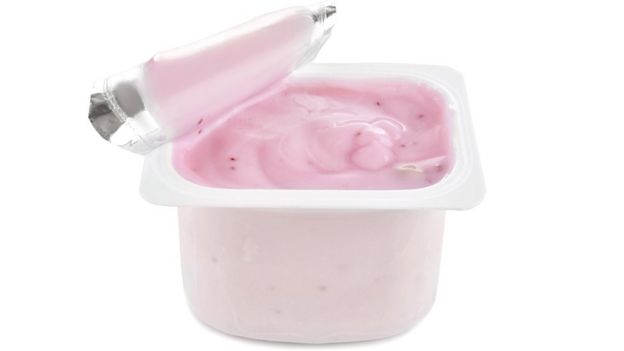
Audio By Carbonatix
Many yoghurts are full of sugar and the public should not be lulled into thinking they are eating healthy products, researchers say.
The conclusion comes after a study of almost 900 yoghurts on sale in UK supermarkets.
The Leeds University-led research found that organic yoghurts were among the most sugary types - containing more sugar per 100g than cola.
Only natural and Greek-style yoghurts could be classed as low in sugar.
The study - published in BMJ Open - comes as government health officials are encouraging manufacturers to reduce the amount of sugar consumed by the public.
Yoghurts have been identified as one of the food types on which Public Health England wants to see progress.
This research was undertaken shortly after the launch of the sugar-reduction programme.

Unsurprisingly, yoghurt desserts contained the most sugar - an average of 16.4g per 100g.
This category also included some products that did not contain yoghurt, such as chocolate mousse and creme caramel.
The second most sugary product was organic yoghurts with a typical 13.1g per 100g.
Children's yoghurts typically contained 10.8g per 100g, the equivalent of more than two sugar cubes, the study found.
By comparison a 100g serving of a typical cola contains 9g of sugar.
The NHS recommends that children aged four to six have no more than 19g of sugar, or five sugar cubes a day, and it is advised that those aged seven to 10 consume less than 24g daily.
To be classed as low sugar there needs to be no more than 5g per 100g.
Only 9% of products surveyed were below this threshold.

How much sugar was in the yoghurt?
Desserts - 16.4g per 100g
Organic - 13.1g per 100g
Flavoured - 12g per 100g
Fruit - 11.9g per 100g
Children's - 10.8g per 100g
Dairy alternatives - 9.2g per 100g
Drinks - 9.1g per 100g
Natural and Greek - 5g per 100g

Since the fieldwork for the study was carried out - at the end of 2016 - progress has been made on reducing sugar consumption from yoghurts.
A report published in May showed sugar content in yoghurts had been reduced by 6% in the first year, making it the only food category to exceed the 5% target. By 2020, it is expected sugar will be reduced by 20%.
PHE chief nutritionist Dr Alison Tedstone said this showed "positive steps" were being made.
But Dr Bernadette Moore, lead researcher of this study, said: "Even if we take the reduction into account, most of these yoghurts will still not be low in sugar.
"I think people, including parents, will be surprised to know just how much sugar there is in yoghurt.
"My advice would be to buy natural yoghurt and mix in your own fruit."
Latest Stories
-
Kumasi residents raise alarm over poor street lighting ahead of Christmas
29 minutes -
Police swoop in Kintampo nabs 13 in drug bust, seizes cannabis and tramadol
39 minutes -
Activist urges stronger border security, environmental protection, and accountability
49 minutes -
Let’s be more intentional about our unity than they were about our division – Mahama to diaspora
54 minutes -
Former Jasikan MCE quits as Bryan Acheampong’s coordinator; declares support for Bawumia
55 minutes -
2025 Diaspora Summit: Ablakwa calls for concrete action on reparations
1 hour -
Police crack down on drug trafficking in Tamale, arrest 4 and seize illicit substances
1 hour -
Egg-citing deals as The Multimedia Group’s X’mas Egg Market sells out on Day 1, returns tomorrow
2 hours -
NPP Primaries: Electoral Area Coordinators in Yunyoo, Chereponi and Saboba declare support for Bawumia
2 hours -
Revocation of L.I. 2462 step in the right direction – Lands Ministry Spokesperson
3 hours -
Afeku urges creation of world-class hospitality training school in Volta Region
4 hours -
Ghana’s unemployment rate eases slightly to 13.0% in 2025 third quarter
4 hours -
Climate change forcing migration as Farm Radio engages stakeholders on solutions
4 hours -
Financial knowledge secures the future – NIB to Police Ladies
4 hours -
Afeku calls for major tourism investment in Volta Region to drive jobs and growth
4 hours

